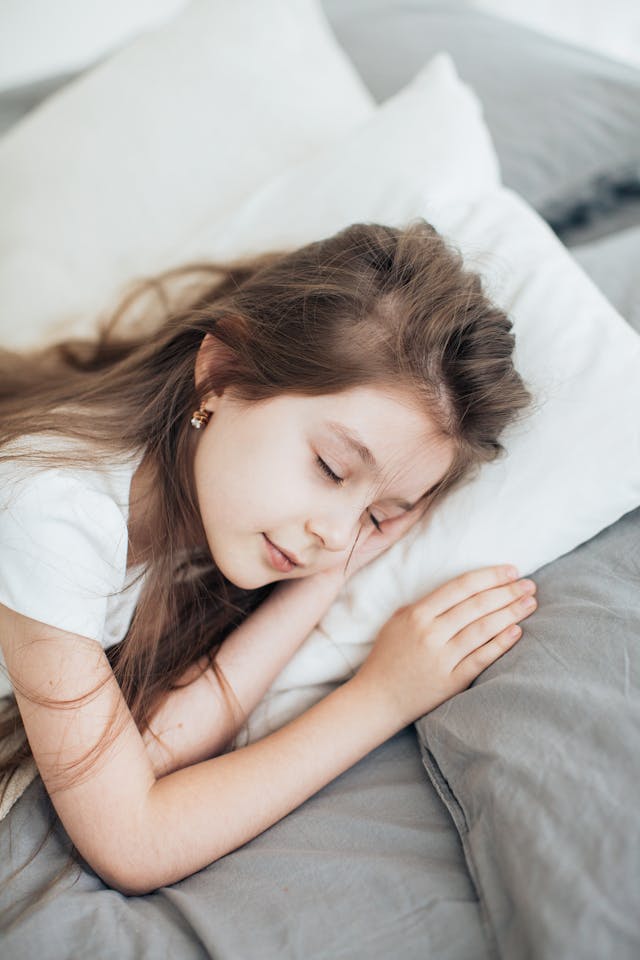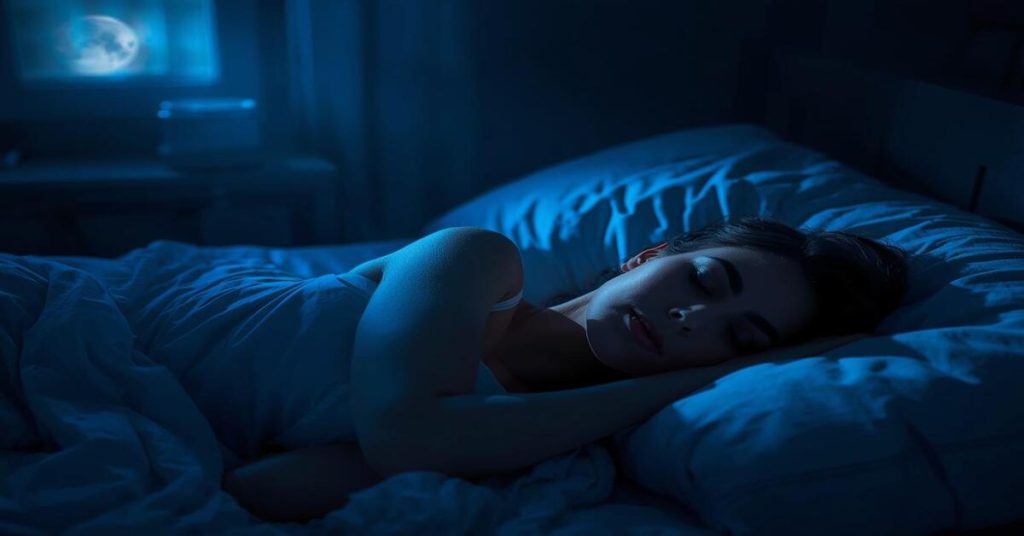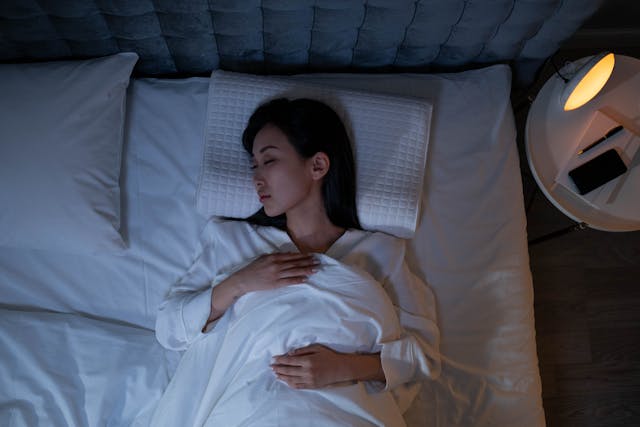How Sleep Affects Mental Health: The Connection You Shouldn’t Ignore 🧠💤
Sleep is more than just a time to rest—it’s a powerful tool that directly influences our emotions, thoughts, and overall mental well-being. In this post, we’ll explore how sleep affects mental health in real, science-backed ways and offer tips to support both your mind and body. 🌙
This article is for educational purposes only and aims to raise awareness about sleep and mental well-being. It does not replace medical advice.
🧠 What Happens to Your Brain During Sleep?

When you sleep, your brain goes into repair mode. It clears out toxins, processes memories, and resets emotional balance. During deep sleep stages, especially REM sleep, emotional experiences are sorted, and the brain strengthens cognitive functions. 🛌 This process shows exactly how sleep affects mental health by helping us wake up refreshed and emotionally stable.
😟 The Link Between Sleep and Anxiety
Sleep deprivation increases activity in the amygdala—the brain’s fear center. As a result, people feel more emotionally unsettled and stressed after a poor night’s rest. Ongoing poor sleep may contribute to emotional disorders. So if you’ve ever felt panicked or nervous after staying up late, now you know how sleep affects mental health.
Read more: “Top 42 Natural Tips to Sleep Better at Night and Boost Mental Wellness 😴🧠”
😞 Low Mood and Sleep Disruption
Low mood and sleep disturbances often go hand in hand. People experiencing emotional difficulty may face insomnia or oversleeping.Sleep quality is a key marker used by mental health professionals to assess mood disorders. This is another strong indicator of how sleep affects mental health deeply over time.
💥 Emotional Instability from Sleep Loss

Ever cried for no reason after a sleepless night? That’s not just moodiness—it’s a direct result of disrupted emotional regulation. Emotional control diminishes, making you more reactive and impulsive. These emotional shifts perfectly demonstrate how sleep affects mental health and day-to-day interactions.
📉 Sleep Deprivation and Cognitive Decline
Chronic poor sleep can lead to poor decision-making, memory issues, and trouble concentrating. These cognitive impairments often contribute to mental exhaustion, making daily tasks feel overwhelming. Clearly, how sleep affects mental health includes long-term brain function and productivity.
🛌 Sleep Disorders and Psychological Conditions
Insomnia, sleep apnea, and restless leg syndrome are not just sleep issues—they’re deeply tied to mental illnesses like depression, PTSD, and ADHD. Managing these disorders can dramatically improve mental clarity. Again, this reveals how sleep affects mental health on multiple levels.
🧘 Mental Wellness Exercises for Better Sleep

To support your sleep and mental health together, try mindfulness meditation, deep breathing exercises, and gratitude journaling. These habits promote relaxation and improve sleep quality. It’s a positive cycle: the better you sleep, the better you feel—and this reinforces how sleep affects mental health positively.
🍽️ Nutrition and Lifestyle Choices That Help
Reducing caffeine after 2 PM, avoiding heavy meals at night, and maintaining regular sleep times all contribute to better rest. A healthy lifestyle directly supports your emotional well-being, again confirming how sleep affects mental health through everyday habits. 🥗
📱 Avoiding Technology Before Bed
Blue light from screens disrupts melatonin production, delaying your sleep cycle. This contributes to poor rest and higher stress levels. Try to keep phones and laptops away at least an hour before bed. It’s a simple but powerful reminder of how sleep affects mental health in the digital age. 📵
🚨 When to Seek Professional Help

If poor sleep continues for more than a few weeks and starts affecting your mood, relationships, or daily functioning, it’s time to speak with a healthcare provider. Insomnia and sleep-related anxiety are common but treatable. Never ignore warning signs—early support makes a big difference in how sleep affects mental health recovery.
Read more: Functional Fitness Guide: Build Strength, Mobility & Endurance for Everyday Life 💪
🧩 The Science Behind Sleep and Mental Health
When we sleep, our brain enters multiple cycles, including REM (Rapid Eye Movement) and non-REM stages. Each of these stages plays a vital role in processing emotional experiences, consolidating memories, and balancing neurotransmitters like serotonin and dopamine. If any of these sleep stages are disrupted, our mental health can suffer.
This clearly explains how sleep affects mental health on a biological level. For example, serotonin—which stabilizes mood—is regulated during sleep. If your sleep is consistently poor, serotonin levels can drop, leading to emotional discomfort or low mood.
🌪️ Chronic Sleep Problems and Mental Illness
Research shows that individuals with chronic sleep problems are at a significantly higher risk of developing mental disorders. Insomnia, for instance, is not just a symptom of anxiety—it can also be a cause. Similarly, people with bipolar disorder often experience disturbed sleep patterns, which can trigger episodes.
Understanding how sleep affects mental health helps professionals diagnose and treat conditions more effectively. A person complaining of low energy and mood swings might be suffering more from poor sleep than any primary psychiatric issue.
🧭 How Much Sleep Do You Really Need?

Adults generally need 7-9 hours of quality sleep per night. However, it’s not just about the number of hours—you need deep, uninterrupted sleep. Waking up frequently or sleeping at odd hours affects your internal body clock (circadian rhythm), which again ties into how sleep affects mental health.
Teenagers and young adults especially need more sleep due to brain development. If sleep is sacrificed for late-night study, scrolling on phones, or gaming, the brain doesn’t get enough time to reset—leading to mental burnout.
🧠 Sleep and Emotional Shock: A Deeper Link
Individuals with past emotional stress, such as PTSD, often struggle with sleep. Nightmares, night sweats, and restlessness are common. These individuals relive stressful experiences during REM sleep, making it difficult to rest deeply.
This showcases yet another example of how sleep affects mental health—when the brain can’t regulate fear or stress, healing becomes harder. Professional therapy, sleep aids, and mindfulness techniques are often needed to restore a healthy cycle.
🏃♀️ Physical Activity to Improve Sleep and Mood
Exercise is a natural booster for both sleep and mental well-being. Regular physical activity helps the body release endorphins (feel-good hormones), reduces stress, and improves sleep quality. Activities like walking, yoga, or even 15-minute stretches can make a big difference.
Adding light physical movement to your daily routine is one of the easiest ways to support how sleep affects mental health positively. Just avoid intense exercise right before bed as it might energize you too much.
Read more: Complete Fitness and Exercise Guide for a Healthy Lifestyle 💪🏃♀️0
🌿 Herbal and Natural Support for Sleep

If you struggle to fall asleep, try natural remedies like chamomile tea, lavender oil, or magnesium-rich foods. These support relaxation and gently prepare the body for rest. Unlike prescription pills, they rarely come with side effects and support the natural sleep cycle.
Holistic methods like aromatherapy or gentle music also contribute to mental calmness—reaffirming how sleep affects mental health through natural and sustainable methods. 🌼
📊 What Studies Say About Sleep and the Mind
Numerous scientific studies confirm the bidirectional relationship between sleep and mental health. A 2020 study by Harvard Medical School found that people who averaged less than 6 hours of sleep per night were 2.5 times more likely to experience Symptoms of emotional imbalance.
Meanwhile, the University of California reported that improving sleep hygiene in Patients with stress-related conditions saw a 40% improvement in just 4 weeks. These results reinforce the idea that how sleep affects mental health is not just anecdotal—it’s science-backed.
🎯 Building a Personal Sleep Strategy
Everyone’s sleep needs are slightly different. The key is to track your sleep habits and identify what works for you. Some people benefit from warm baths, others from white noise machines or sleep masks.
Developing a consistent bedtime, cutting out caffeine after lunch, and winding down with calming routines are powerful ways to protect your mental peace. Consistency is key when it comes to how sleep affects mental health over time.
🤝 Involving Family and Loved Ones

Sometimes, your sleep is affected by your environment—noisy surroundings, stress at home, or caring for others. Open communication with your family or housemates can lead to shared routines that support better sleep for everyone.
Even small gestures like turning off lights earlier or sharing quiet evening activities can reinforce how sleep affects mental health in a family-wide, supportive way. 💗
Read more: 15 Healthy Eating Habits to Boost Energy & Wellness 🌿
🧠 The Role of Sleep in Emotional Regulation 😴
How sleep affects mental health becomes most evident when we experience emotional imbalance. Without enough rest, we’re more likely to feel anxious, irritated, or overwhelmed by everyday challenges. Quality sleep helps regulate emotional responses and builds mental resilience.
🌙 Sleep and Stress Hormones: The Hidden Impact 😮💨
One of the most overlooked aspects of how sleep affects mental health is its impact on stress hormones. Sleep deprivation increases cortisol levels, which can lead to heightened anxiety and emotional instability. Sleeping well helps lower this stress and protects mental clarity.
🧘♂️ How Deep Sleep Supports Mental Recovery 🛌
A deeper understanding of how sleep affects mental health shows that during deep sleep, the brain performs emotional “housekeeping.” It processes experiences, repairs neural pathways, and prepares us for a new day. Missing this phase disrupts your mental recovery cycle.
🌟 Final Thoughts

Your mind and body are deeply connected, and sleep is the bridge between them. Prioritizing your rest is not a luxury—it’s a mental health necessity. The more we understand how sleep affects mental health, the better we can take care of ourselves. So tonight, turn off the noise, close your eyes, and give your brain the rest it deserves. 😴
💬 Share Your Thoughts
Have you noticed how your mood changes after a poor night’s sleep? Comment below and tell us how sleep affects your mental health. 💬
For more insights on how sleep impacts brain health, visit Sleep Foundation’s official guide.
To read general lifestyle advice on sleep routines, you may also check this article from Healthline.



Pingback: Natural Glowing Skin: Proven Tips for Radiant Beauty Naturally0
Pingback: Motivation and Self-Growth Tips to Transform Your Life | DayHealty0
Pingback: Top 10 Proven Functional Training Exercises for Real-Life Strength & Mobility
Pingback: Deep Restful Sleep for Better Mental Wellness100%
Pingback: Sleep Quality and Emotional Well-Being: The Hidden Link 100%
Pingback: Top 20 Sleep Mental Wellness Tips to Improve Mood, Focus & Sleep Quality